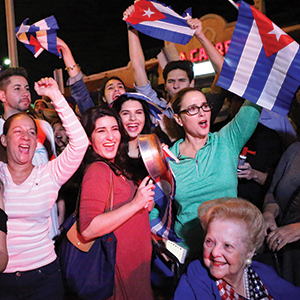Leaders from Church and state around the world responded to the death on 25 November of Cuban dictator Fidel Castro with hope for the future of Cuba, write Michael Sean Winters and James Roberts. Pope Francis, who met with Castro in September 2015, expressed sorrow over the dictator’s death in a telegram to Castro’s brother, Raúl. “Upon receiving the sad news of the death of your dear brother, His Excellency Mister Fidel Alejandro Castro Ru ... I express my sentiments of sorrow to Your Excellency and other family members of the deceased dignitary, as well as to the people of this beloved nation,” his telegram read.
US leaders of both Church and state reacted with ambivalence. “We know that this moment fills Cubans – in Cuba and in the United States – with powerful emotions, recalling the countless ways in which Fidel Castro altered the course of individual lives, families, and of the Cuban nation,” said President Barack Obama. “History will record and judge the enormous impact of this singular figure on the people and world around him.”
Archbishop Thomas Wenski of Miami, where Cuban exiles were celebrating in the streets, quoted from the Bible. “In the Old Testament Book of Ecclesiastes, we read: ‘...both the just and the wicked God will judge, since a time is set for every affair and for every work.’ (Ecclesiastes 3:17) Fidel Castro has died. Now he awaits the judgment of God who is merciful but also just. His death provokes many emotions. Nevertheless, beyond all possible emotions, the passing of this figure should lead us to invoke the patroness of Cuba, the Virgin of Charity, asking for peace for Cuba and its people.”
Florida Senator Marco Rubio, who is of Cuban descent, was less ambivalent. He told CNN that he hoped President elect Donald Trump would back away from the steps Mr Obama took to normalise relations with Cuba. “[Trump] has made very clear that he felt that the moves President Obama has made toward Cuba were wrong and that he would examine them and change the ones that needed to be changed. And I think that’s very promising.”
Archbishop González Nieves of San Juan de Puerto Rico recalled that when he first visited Cuba as a new bishop in 1989, the “churches were practically empty”, but that the situation of the Church has improved vastly. “I have great admiration for the Church in Cuba,” he said. “It is a Church of living martyrs.”
Frei Betto, Dominican friar, liberation theologian and close friend of Castro, said: “I believe that in his final years he became agnostic. He liked to hear me speak of the Gospels, he admired Popes John Paul II and Francis, and a number of times, when he was saying goodbye, he asked: ‘Pray for us’.”
01 December 2016, The Tablet
Hopes for Cuba’s future after Castro’s death
 Loading ...
Loading ...
Get Instant Access
Subscribe to The Tablet for just £7.99
Subscribe today to take advantage of our introductory offers and enjoy 30 days' access for just £7.99



